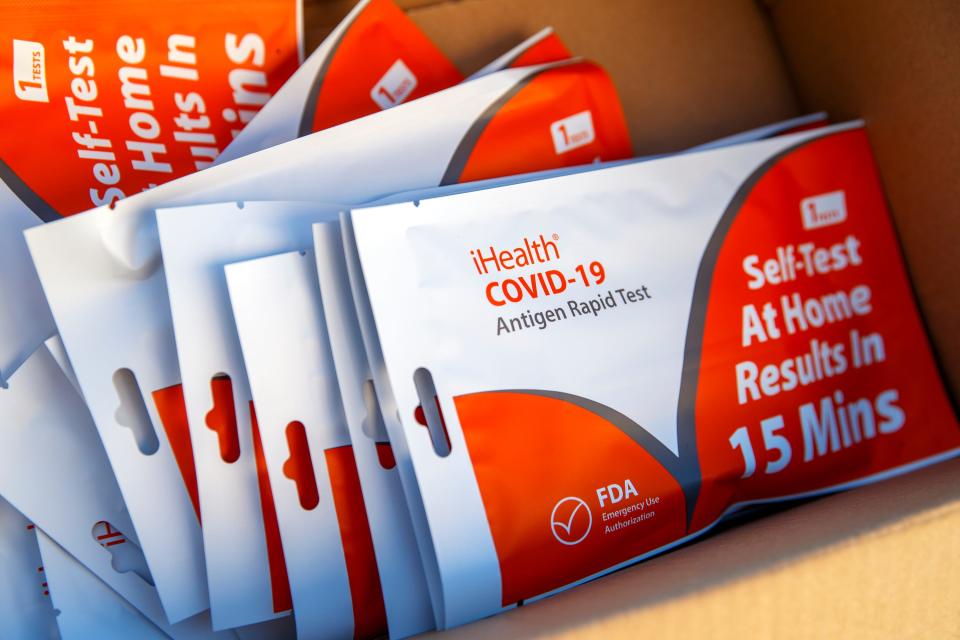Amid omicron and staffing shortages, tribal health network still testing, boosting patients
With the rampant spread of the omicron variant, many patients who are displaying symptoms or have been exposed to COVID-19 are rushing to Riverside-San Bernardino County Indian Health Inc., a network of tribal health clinics in Southern California, to be tested, said CEO Bill Thomsen.
That testing demand, coupled with virus-related staffing shortages, has forced the network to pare back to essential services.
“We are honestly just so overwhelmed with the new variant and testing patients; that's basically what we're doing from 8-5," Thomsen said Wednesday. “And that’s between staff shortages from COVID-19 and staff exposures. Because of that it's really put a bind on our system of care right now.”
Shortly after Christmas, the network started feeling the pressure from omicron, Thomsen said. Since then, the health system has converted some visits from in person to over the phone, both to allow staff to focus on testing and to add a measure of safety.
Indian Health Inc., a regional health program that falls under the federal Indian Health Service, has roughly 17,500 active patients. The system sees Native Americans from any federally recognized tribe who live in Riverside and San Bernardino County.
The network has fully vaccinated at least 10,200 people (a group that encompasses the system’s registered patients, employees from tribal enterprises and family members) and administered about 700 booster shots, Thomsen said. He did not have an estimate of what percentage of the network’s patients had been vaccinated.
Broader Riverside County has fully vaccinated roughly 1.37 million total residents, or 59% of the eligible population, and boosted slightly less than 25% of the population age 12 and up, according to COVID-19 vaccination data published on Thursday. The county reported that about 40% of the eligible American Indian and Alaska Native population has been fully vaccinated, compared to about 55% of the county’s white population.

“There's still some mistrust, some historical mistrust,” Thomsen said of vaccine hesitancy. “I think it also goes back to [misplaced fear around] the speed at which this vaccine was developed. There are personal opinions on vaccines in general, from individuals who are both Native and non-Indian.”
Anecdotally, Thomsen has noticed more resistance among younger people in getting the vaccine than among tribal elders. There also seems to be a sense of complacency with some patients who feel secure without the booster shot, he said, and aren't necessarily swayed by outreach or educational efforts.
The network has recently seen more of a demand for COVID-19 testing than for boosters or vaccines.
“Some patients have told us they've got the series of two [shots], and that's what they're going to stick with,” he said. “It's still ultimately their decision on how they want to move forward in the vaccination process, but we are encouraging our patients to get that booster, or complete the series if they haven't already.”
More: SoCal tribal health clinic network has vaccinated 23% of patients, plans for thousands more
More: After facing supply shortages, Southern California tribes work to expand COVID-19 testing
Staff from different departments within the network, from eyecare to pharmacy, have been helping out in other roles, including bringing patients in and out, letting the medical team know when someone is ready to be tested, and other tasks, Thomsen added. Optometrists have even delivered vaccines during especially busy periods, which they are authorized to do in California and several other states.
“The staff has been magnificent in the way that they’ve performed in the last couple weeks,” he said.
Another upside, he said, is that actually obtaining vaccines and testing supplies hasn’t been an issue. Across the country, tribal health programs and urban Indian organizations were given the choice last year between getting the COVID-19 vaccine through the Indian Health Service or their state.
Indian Health Inc. went with IHS, a decision that Thomsen is grateful for; the agency is still doing "an excellent job" in providing shots, he said.
These days, his motto with the network is "improvise, adapt and overcome,” he added. “That's what we're doing.”
Amanda Ulrich writes for The Desert Sun as a Report for America corps member. Reach out on Twitter at @AmandaCUlrich or via email at amanda.ulrich@desertsun.com.
This article originally appeared on Palm Springs Desert Sun: Amid staffing shortages, tribal health network still testing patients

